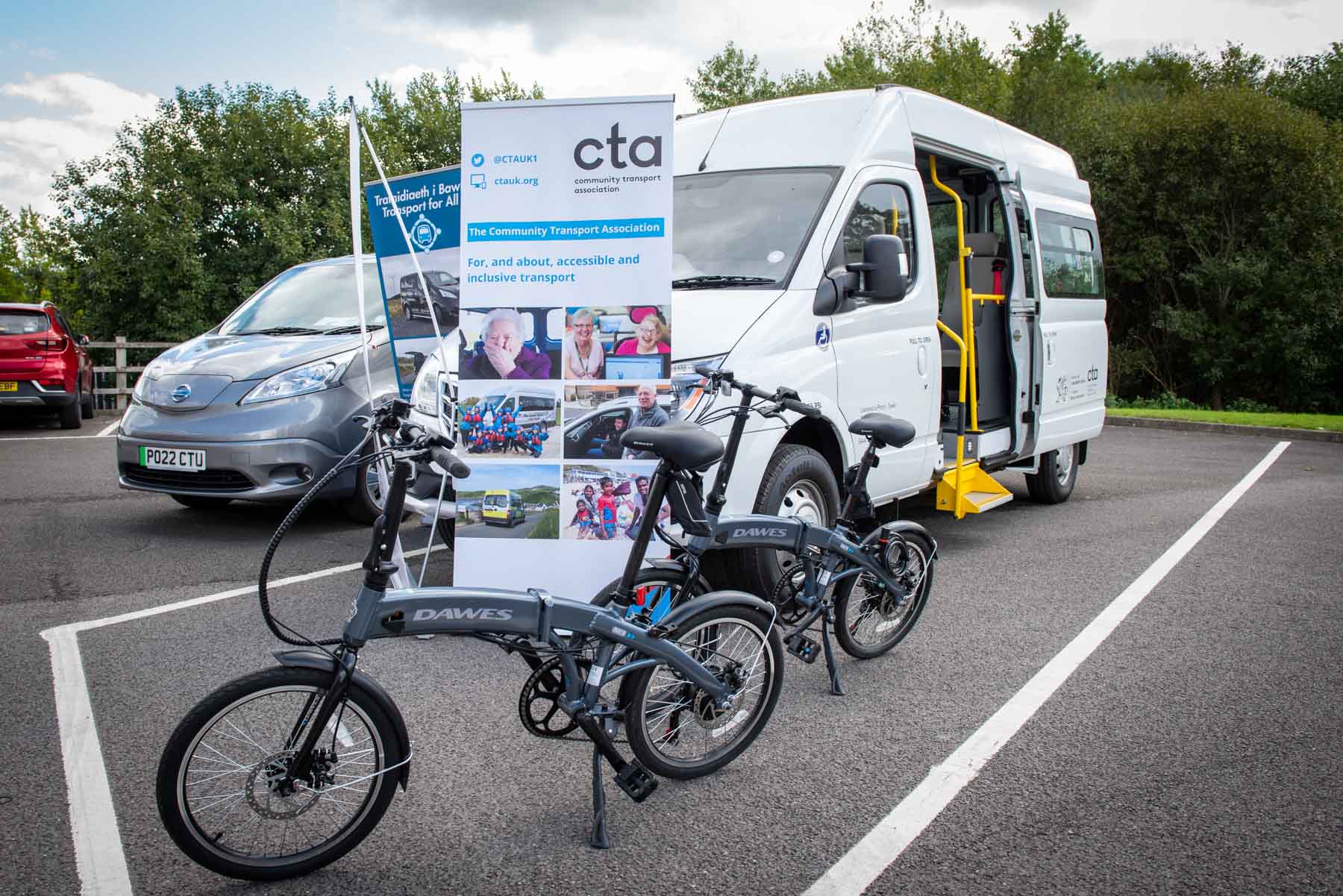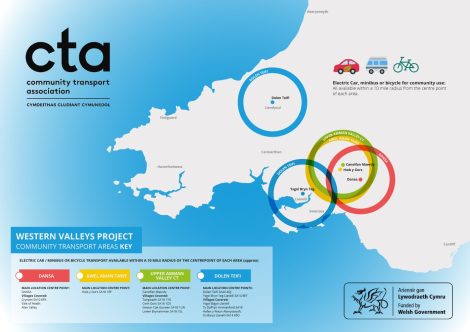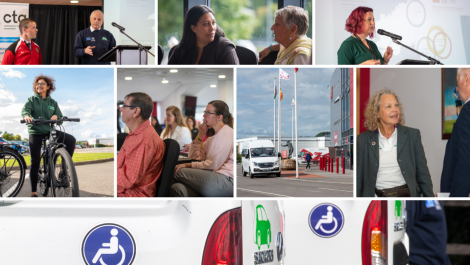-

Western Valleys Transport Pilot launch
-
14th October 2022
-
-
by Gemma Lelliott
Director for Wales
![A collection of photos from the launch event, featuring Lee Waters, Gemma and a selection of event attendees]()
It was wonderful to have the opportunity to get together with people from across south Wales at the launch event for the Western Valleys transport pilot at Parc y Scarlets, Llanelli, a few weeks ago. This project, which originally emerged as a priority from the work of Welsh Government’s Valleys Regional Taskforce, has evolved and grown with the support of Welsh Government’s Household Support Fund, with four community transport operators working with their communities to design and pilot new, sustainable, and inclusive transport options across parts of Swansea, Neath Port-Talbot, Carmarthenshire and Ceredigion.
I want to again thank Lee Waters, Deputy Minister for Climate Change, for joining us to launch the project and for his warm words of support. We would also like to thank the Minister and all the civil servants who have worked alongside us to make this project a reality. We have had so much support from Welsh Government to get to this point, I really can’t overstate how important it is to be trusted to work in this innovative, community-led way, and how grateful we are for the opportunity to do so. I’m sharing an extract of my speech from the launch here, to give everyone a window into the importance of this project and why the whole CTA Cymru team are so excited about leading this work.
Like the Minister, at CTA we believe that transport is a social justice issue, and is about so much more than just getting from A to B. Thinking holistically about the ways in which transport – or the lack of it – can impact on all aspects of our lives, supporting more people to make the switch to sustainable transport modes has never been so important.
I spend a lot of time thinking about how to improve services for the people I’ve met since I first started working in access and inclusion more than a decade ago. For example, people like Mark, a young man who is blind and has a learning disability, who wants to go out to gigs with his friends. Beth, who was made redundant due to the pandemic and has struggled to find a new job because she doesn’t have a car. Andrew, an older man who lost his sight due to macular degeneration, and didn’t leave his house for more than 18 months (before covid shielding and lockdowns hit). And Alison, who works full time and also cares for her elderly mum.
As you can imagine, without an integrated, accessible transport system, people like Mark, Beth, Andrew and Alison could easily fall through the cracks. As we navigate a new reality in the wake of Covid 19, it has never been so important to safeguard and develop transport solutions that truly work for the communities we serve. And with the opportunities created by Welsh Government through Llwybr Newydd and Bws Cymru, we have never been better placed to deliver an effective, more affordable, more inclusive, and more integrated local passenger transport network that can meet the needs of all passengers and be the first and best choice for making a journey.
A lack of transport, or poor quality and inaccessible transport, can have a substantial impact on your quality of life, your economic and social opportunities, and the type of activities you can get involved with. This can lead to people being stuck driving a car – even when they can’t actually afford to – or becoming isolated and excluded from opportunities, across a whole range of areas, including employment, education, health, and social and cultural activities. One of the very first community transport passengers I met when I started working at CTA described her house as a ‘beautiful prison’ – since her husband died, she had been trapped at home because of the lack of buses, as she couldn’t drive herself and the taxis in her area were far too expensive for anything except the most essential journeys.
If we are serious about getting people out of private cars, and about supporting those who are currently cut off from their communities, we need a transport system that works for every part of a person’s life. We are not just parts of an economic system, we are unique individuals with a huge variety of needs and interests – our transport services need to reflect and enable that. If we want to reshape travel habits, we need to see every prospective passenger as someone of value. Whatever the reasons for your journey, your mobility support needs, your preferred journey time, or your income bracket, we all need to see the public transport network as a viable and accessible option, even if it is only for some of the journeys we make.
![A map of the Western Valleys pilot project's operating area, showing the locations of the four delivery partners.]()


This is all part of why I am so passionate about community transport, and why we think this project is so important. Our partners have worked collaboratively with the communities they serve, to develop solutions that actually meet peoples’ needs. New services are being piloted in parts of Wales that have historically had very little commercial transport on offer, and will strive to connect people in innovative ways. Building links and a decarbonised network that connects Valleys, towns and villages, health settings, public transport interchanges, schools and colleges, rural and urban communities, employers, and tourist attractions, this community-led pilot has the potential to deliver not only significantly better transport for people living across South West Wales, but also a huge range of data that helps us in making better decisions and planning better services for the whole of the country. As the project evolves, services will change and new connections will develop as different priorities emerge. It’s going to be a challenge which the whole project team is committed to approaching with positivity and transparency, so we can learn collaboratively, rapidly and iteratively.
It’s a really exciting time for the transport sector in Wales, and at CTA we have a clear vision of what we want to achieve, much of which is being piloted here. We want to see sustainable funding going into public and community transport which also considers how active travel can be integrated for those able to use it. A decarbonised fleet, connected with communities who own the energy that powers the vehicles, and are run by operators who collaborate and share their learning and expertise. We want to see members of the community shape the services they use, so those services can adapt and evolve to ensure they carry on meeting the needs of local people. And we want to see recognition from across the public sector that accessible transport can be a key enabler for success.
Accessible, inclusive and integrated transport systems are transformative, and they are key to tacking both the climate emergency and the cost of living crisis. We are really excited about the potential for the future, and looking forward to connecting and collaborating with our partners across the public, private, and third sectors, to build more opportunities for everyone in Wales to make the change to sustainable shared transport.
![Another gallery image of photos from the event, including all our speakers and some of the vehicles they use to deliver this project]()

 All photos courtesy of Natasha Hirst, https://natashahirstblog.co.uk/
All photos courtesy of Natasha Hirst, https://natashahirstblog.co.uk/Leave a reply
2 Comments
-
-
- About CTA
- /
- CTA Membership
- /
- CTWeek24
- /
- Policy & Research
- CommunitySolutions: A Manifesto for the Next UK General Election
- Our Campaigning Guide for Community Transport
- Our Policy Work
- Join Our Mapping England Passenger Survey
- Aneurin Bevan Transport to Health
- Climate Action in Scotland
- conneCTing England Programme
- Mapping Scotland Project
- Mapping Wales
- Mapping England
- Tackling Loneliness in England
- Healthy Communities in Scotland
- /
- Advice & Support
- /
- Training
- /
- Events
- /



Jason Donaghy - Fermanagh Community Transport Ltd
The pilot sounds extremely exciting and something which we in Northern Ireland could potentially learn from. Look forward to learning more!
Gemma Lelliott
replying to Jason DonaghyThanks so much Jason, we are all really excited about it too! We will be reporting back regularly as the project grows and progresses, and I’d be very happy to connect with you via Noeleen to tell you more when we have some data we can share.